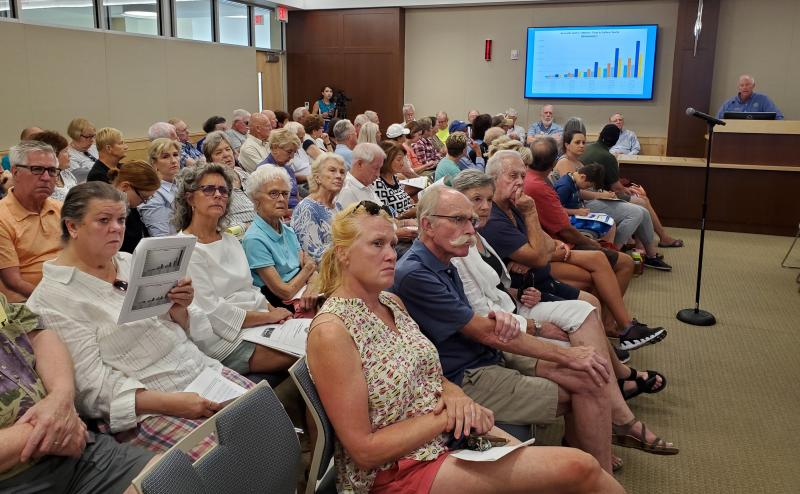Rehoboth citizens: Keep peak/nonpeak utility rates
Last month, a working group formed to study water and wastewater rates in Rehoboth Beach presented a flat-rate plan that would keep water rates constant year round. The flat-rate plan would replace the city’s peak/nonpeak approach to billing, under the phrase, “Use less, pay less. Use more, pay more.”
During a town hall July 12, city citizens got a chance to respond to the proposal, and they all implored city commissioners to keep the peak/nonpeak approach because they say it is more fair to year-round residents.
Rehoboth is examining the city’s utility rate structure because it has loans to pay off and also faces expensive system upgrades. According to a report conducted by Massachusetts-based The Abrahams Group, in addition to the $42 million spent on the recently completed ocean outfall, city engineering consultant GHD has recommended roughly $4.8 million in improvements to the city’s water system and roughly $12.4 million more in improvements to the city’s wastewater system through fiscal year 2023.
For the most part, a presentation at the town hall by Rehoboth Public Works Director Kevin Williams and working group member Michael Strange was the same given to the commissioners in June.
Under the group’s proposal, for every 1,000 gallons used, the city would charge $14.70 for wastewater and $6.30 for water. The proposal evaluated infrastructure needs for the next 12 years, and the group proposed adjusting the flat rate every four years.
The group also proposes a ready-to-serve fee for the two utilities that is unrelated to usage. Those served by a 1-inch meter, an estimated 96 percent of users, would be charged about $125 annually for wastewater and about $42 annually for water. For those with 2-inch meter, annual fees would rise to $452 for wastewater and about $154 for water. The ready-to-serve fees increase for 3-inch, 4-inch and 6-inch meters, but total revenue collected by the city would decrease because there are very few meters of more than 2 inches.
The group has proposed the city have capital and operational reserves set aside for the two utilities – $300,000 in each reserve for wastewater, $100,000 in each for water, or a total of $800,000 in reserves for water and wastewater.
According to a table prepared by the group, if its proposals were implemented, Rehoboth’s rates for 1-inch meters, through the first four-year cycle, would remain on the lower end when compared to comparable municipalities. A household in Rehoboth that uses 20,000 gallons of water a year would pay an estimated $418 a year for wastewater and $168 a year for water. In Lewes, that same user would pay $876 annually for wastewater and $278 annually for water. A similar household on Tidewater Utilities Inc. would pay $588 for water, according to the presentation prepared by the group.
The biggest change to the presentation was a slide near the end comparing meters of year-round residents to seasonal users using the flat-rate and peak/nonpeak approaches. The table compared total percent of flow against its total percent of the city’s revenue generated from that flow.
Matt Abrahams, of The Abrahams Group, was on the phone during the presentation. He said the new comparison slides validated the group’s work that year-round users do not pay their fair share of costs under the peak/nonpeak system.
Using examples of real billings, under the peak/nonpeak method, the percent of total revenue is less than the percent of total flow for the year-round users, Abrahams said.
Working group member Roger Truitt said the peak/nonpeak rates were built into the system. He said the proposal has fixed costs; the expenses the city has year-round, and those are comparable to nonpeak costs; while the nonfixed costs, expenses for addressing increased demand, are comparable to peak costs.
It’s not easy to grasp, but the concept is there, said Truitt.
Public comment
About a dozen year-round citizens spoke during the town hall, and not one was in favor of getting rid of the city’s peak/nonpeak rate system.
Donna Mabry estimated the city would be shifting nearly $300,000 worth of additional costs to year-round users under the proposed flat-rate structure. She argued the reason for the city’s extra capacity system is to address the summer visitors and businesses.
“I just don’t think that’s fair and equitable,” she said.
Susan Gay said a one-rate system protects the large users. She said the city has excess capacity in the system and suggested selling some to the county to keep rates low.
Edie Herron said she wanted to know if the city was still looking to sell its wastewater treatment facility to the county.
Mayor Paul Kuhns said that was not an option on the table at this time.
Former Commissioner Jan Konesy said she was also in favor of selling the system’s excess capacity to keep costs down on city residents.
Former Commissioner Jay Lagree said citizens voted to take on the debt to make improvements, so it makes sense to give them a break when having to pay off the loans.
Mark Betchkal asked if the city could issue bonds so the rates would be lower and paid off over the life expectancy of the improvements.
Kuhns said the city’s revenue isn’t stable enough to get a good rate on the public marketplace. He said typically cities have a much higher percentage of their revenue based on property taxes, but in Rehoboth a significant portion of the revenue is generated from parking and other tourist-related sources.
No business owners spoke during the meeting.
In an email July 14, Kuhns said he’s heard little from the business community since the new rate structure was proposed. He said he thinks it points to the fact that the business owners understand both the need to have an updated fair and equitable rate structure, and that they believe there needs to be the upgrades and improvements to the infrastructure in order to provide the necessary services to the community.
There was very little commissioner comment during the meeting. Kuhns said there would be more discussion at the commissioner workshop in August, with a possible vote on the rate structure during the commissioner meeting Friday, Aug. 16.
Chris Flood has been working for the Cape Gazette since early 2014. He currently covers Rehoboth Beach and Henlopen Acres, but has also covered Dewey Beach and the state government. He covers environmental stories, business stories and random stories on subjects he finds interesting, and he also writes a column called Choppin’ Wood that runs every other week. He’s a graduate of the University of Maine and the Landing School of Boat Building & Design.






















































